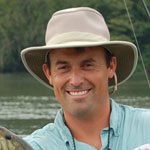
Fall is a great time for pond management, and rotenone is a big help
Ponds can provide some the most enjoyment of any outdoor experiences, but poor management can ruin a prime fishing paradise in a short time. Undesirables such as the golden shiner, green sunfish, gizzard shad and common carp can destroy the bass/bream balance in record time. Ponds severely out of balance can also send pond owners over the edge. A poorly managed pond is just not fun, but there is a solution to every problem in the pond-management arena, and it is called rotenone!
Basically, rotenone kills every fish in its effective target range. It removes the oxygen from the water, causing fish to suffocate and allowing pond owners to start over from scratch. Sometimes considered a little extreme, there are times when killing everything and starting over is the only solution. While most out-of-balance bass/bream fisheries can be brought back into shape with harvesting, undesirables are tough to single out.
Treatments should be prescribed between April and September when water temperatures are over 70 degrees to receive the best results. Rotenone comes in liquid and powder forms in a 2.5- or 5-percent solution. Pond owners should determine the volume of water in the pond by calculating the area and average depth. If a 5-percent solution is used, 10 pounds of powder or one gallon of liquid per acre-foot should be sufficient for a total kill. The liquid should be mixed with five parts water, and the powder should be well diluted to get an even coverage. Dead fish should be removed and discarded.
Rotenone is quick, and it is not selective — or not on any fish species, anyway. It will not harm any cattle, either, so anyone with a pond in an agriculture setting will have no worries about losing cattle. If conducted properly, pond owners can feel confident that a poor fishery is on a road to recovery. In fact, ponds can be re-stocked within three weeks after a rotenone treatment — or even sooner, in some cases.



Be the first to comment